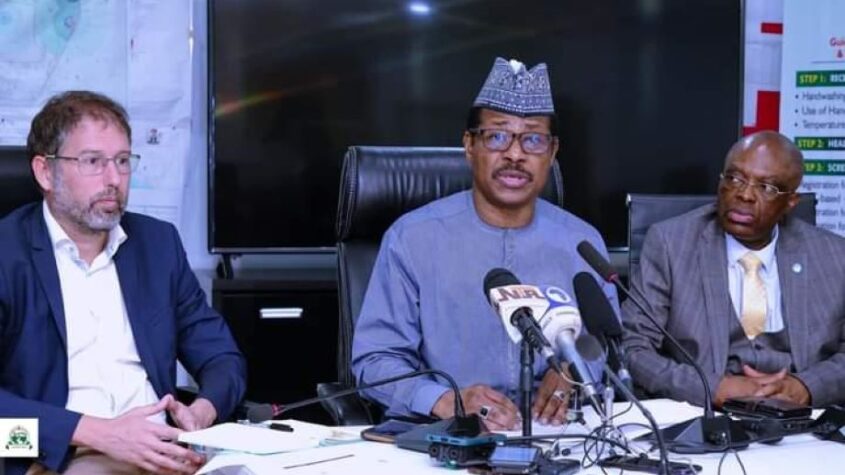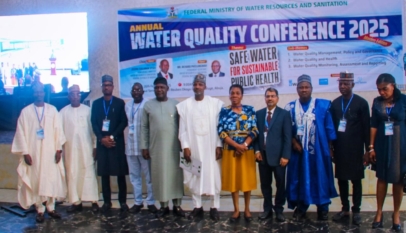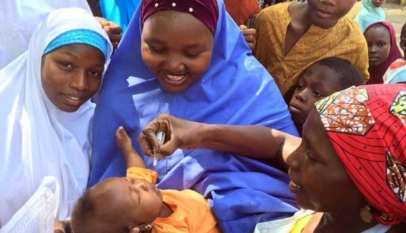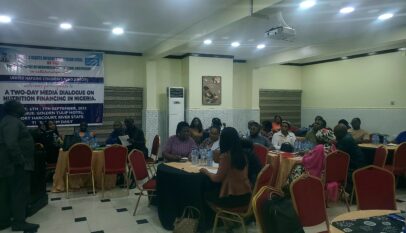
Inadequate skilled health workers responsible for 80% maternal, child death at PHC facilities, launch CRISP – NPHCDA
Concern with the shortage of Skilled Birth Attendant across Primary Health Care (PHC) facilities in Nigeria, 4% per facility, the National Primary Health Care Development Agency(NPHCDA) has introduced a Community-based Health Research, Innovative-training and Services Program (CRISP).
CRISP, aims to leverage rural posting of Resident Doctors from teaching hospitals to boost and guarantee the quality of care at the PHC level through their active involvement in primary health service delivery, targeted at improving Reproductive, Maternal, Newborn, Child and Adolescent Health, amongst other health services within the benefiting communities.
Chief Executive Officer, NPHCDA Dr. Faisal Shuaib at the official launch of CRISP, on Wednesday in Abuja, said 80% of the incidence of maternal and child deaths in Nigeria occur at the community levels, largely due to the lack of services of skilled health workers in the PHC facilities.
He said, “In pursuit of this and other goals for advancing primary health care in the country, you may recall that the Federal Ministry of Health in collaboration with NPHCDA held a well-publicized Primary Health Care summit in March 2022, during which we presented a 4-point agenda for PHC re-imagining.
“As part of this agenda, we discussed the need to close the gaps on the adequacy and distribution of human resource for health at primary health care level. To be guided by evidence, we followed this with a national health facility assessment in 2022.
According to him, “from the assessment revealed that only 1.8% (463 out of 25,843) Primary Health Care Facilities in our country have the minimum number of required Skilled Birth Attendants (SBA) which is 4 per facility. Aside from the gross inadequacy, there is the problem of unequal distribution of available SBAs in the PHC facilities.
Shuaib, said its regrettably, PHC centres are the most unattractive to skilled health workers who prefer to be stationed at urban secondary and tertiary health facilities.
He explained that this has brought a setback in PHC facilities, “we have scientific evidence, showing that the interventions provided by skilled health workers, namely doctors, nurses, midwives, or CHEWs trained on MLSS can reduce maternal and new-born mortality in low and middle-income countries, including Nigeria.
Shuaib, emphasis that the CRISP initiative will operate at scale involving Teaching Hospitals and Federal Medical Centres across the country.
Also, the NPCDA emphasis that the CRISP resident doctors from the engaged teaching hospitals and federal medical centres would be deployed to the primary health care facilities to support service provision and on-the-job capacity building of the PHC health workers. CRISP is targeted for implementation across the 36 states of the Federation plus the FCT in a phased manner.
Meanwhile, UNICEF, representative Eduardo Celades highlighting the alarming statistics gaps in healthcare access and quality, particularly in Nigeria, emphasized that only 70% of pregnant women currently have access to antenatal care, with just 60% receiving complete antenatal checkups.
He noted that only half of the newborns are attended by skilled birth attendants, and neonatal and under-five mortality rates remain high.
Expressing their support and commitment, UNICEF announced its intention to allocate additional resources this year to expand the scope of the CRISP program.
By doing so, they aim to further enhance maternal and child healthcare, emphasizing that this comprehensive approach aligns with their core principles and objectives.
He further informed that another aspect of the CRISP program that has garnered accolades is its focus on primary healthcare, adding that UNICEF’s collaboration with various partners and donors has resulted in a unified effort to strengthen primary healthcare services, building on the revitalization agenda set forth by Dr. Faisal and his team.
This approach he said demonstrates courage and character, ensuring that critical healthcare services are available at the grassroots level.
World Health Organization (WHO), Country Representative, Dr. Walter Mulombo, expressed his congratulations to the executive director and his team on the upcoming launch of a groundbreaking initiative called the Community-Based Research Innovative Training and Services Program.
Dr. Mulombo emphasized the importance of accelerating efforts in the health sector, as called for by the WHO.
According to him, the WHO Director-General is set to unveil a strategy next week during the 75th World Assembly, highlighting the five key areas of focus: promoting health, providing health services, protecting health, empowering health through digital technology and innovation, and performing for health by strengthening WHO country offices.
The timing of this initiative is particularly significant as the WHO has recently declared the end of the Public Health Emergency of International Concern for the COVID-19 pandemic.
While this removes the exceptional status of the event, Dr. Mulombo underscored the need for continued vigilance, as the virus still circulates globally.
He commended the efforts of the Nigerian Primary Health Care Development Agency (NPHCDA) in integrating COVID-19 vaccination with other immunization programs and interventions.
The WHO has developed a revised strategy for COVID-19 preparedness, response, and resilience, based on five pillars: collaborative surveillance, community protection, quality care and scalable care, access to countermeasures, and building local manufacturing capacity for vaccines and medical products.
Dr. Mulombo emphasized the importance of reliable data and evidence in guiding policies and interventions, emphasizing the role of the Community-Based Research Innovative Training and Services Program in generating the necessary evidence.
Furthermore, Dr. Mulombo highlighted the significance of the program’s contribution to the broader agenda of achieving universal health coverage and revitalizing primary health care. He expressed readiness to collaborate with non-state actors, including research institutions, believing they will play a vital role in this initiative.
Dr. Mulombo however expressed his anticipation for a successful launch of the Community-Based Research Innovative Training and Services Program, emphasizing its potential to drive progress in Nigeria and ultimately improve health outcomes.








